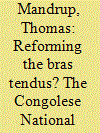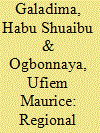|
|
|
Sort Order |
|
|
|
Items / Page
|
|
|
|
|
|
|
| Srl | Item |
| 1 |
ID:
161123


|
|
|
|
|
| Summary/Abstract |
This article explores the phenomenon of herdsmen militancy as a new trajectory for the farmer–herder crisis in Nigeria, with reference to its humanitarian implications. Relying on a systematic analysis of secondary data and aligning with the analytical anchorage of liberal political ecology theory, the article posits that herdsmen militancy depicts a contradiction in agrarian relations in the context of a national security crisis which has been complicated by salient socio-ecological factors such as climate change, armed violence, and identity politics. In view of the dire humanitarian consequences of this situation, the article submits that herdsmen militancy constitutes a major threat to human and national security in Nigeria. It makes a case for a pragmatic policy capable of mitigating the myriad socio-ecological factors that tend to trigger herdsmen militancy, with prohibition on open grazing in critical hotbeds of herder–farmer conflict as a strategic measure.
|
|
|
|
|
|
|
|
|
|
|
|
|
|
|
|
| 2 |
ID:
161122


|
|
|
|
|
| Summary/Abstract |
The security sector reform (SSR) programme in the Democratic Republic of the Congo (DRC) has failed, according to a former high-level member of the United Nations (UN) mission in the DRC, as a large section of the country remains outside government control, and the security institutions of the state continue to constitute one of the predominant sources of insecurity for the local population in a number of ways. Based on several field studies, this article critically scrutinises the SSR of the Congolese National Police (Police nationale congolaise; PNC) and the efforts to reform it between 2004 and 2016. It further attempts to explain why so little progress was made in the SSR of the PNC, despite extensive involvement from donors. The article shows that the instrumental and traditional approach to SSR is partly to blame, because in this case it failed to address the root problems and initiate the needed fundamental reform and reconstruction of the police force. It also shows that reforming local security institutions becomes even more difficult when the local authorities do not support the effort.
|
|
|
|
|
|
|
|
|
|
|
|
|
|
|
|
| 3 |
ID:
161125


|
|
|
|
|
| Summary/Abstract |
Since the mid-twentieth century, the East and Southern African regions have been mired in complex and overlapping security and development challenges, including ethnopolitical conflicts, terrorist insurgencies, the proliferation of small arms and light weapons (SALWs), and overwhelming economic crisis. These challenges have had implications for human security, socio-economic development, territorial authority, sovereignty and the stability and legitimacy of political regimes in the affected states. The adequacy and relevance of the regional responses to these challenges is the subject of ongoing debate, to which this paper now adds. Among other factors, this paper identifies competition for regional dominance and institutional inadequacies as accounting for the inability of regional governance bodies to respond adequately to the challenges they face. Consequently, it recommends the expansion of the mandate of the Regional Economic Communities (RECs) beyond regional economic integration to include peacebuilding and a deepening of the institutional efforts focused on security cooperation and conflict management.
|
|
|
|
|
|
|
|
|
|
|
|
|
|
|
|
| 4 |
ID:
161124


|
|
|
|
|
| Summary/Abstract |
Since the 2003 war in Iraq, private military and security companies (PMSCs) have become increasingly legitimate actors in modern conflicts. Despite this normative shift, rumours in March 2015 regarding the use of South African mercenaries in Nigeria to combat Boko Haram insurgents caused an international outrage, while the Nigerian government remained nonchalantly silent on the matter. This article investigates the impact of mercenaries on the conflict in the last six months of the Jonathan government. Using primary and secondary qualitative research, it assesses the role that PMSCs played in Nigeria’s counterinsurgency strategy, along with the ensuing reaction of international and local media to the outsourcing of violence to foreign companies. The article concludes that – notwithstanding the improved image of PMSCs in the world, and the actual impact of the contractors on the Nigerian counterinsurgency effort – the stigma of mercenaries continues to plague the industry, particularly on the African continent.
|
|
|
|
|
|
|
|
|
|
|
|
|
|
|
|
| 5 |
ID:
161126


|
|
|
|
|
| Summary/Abstract |
This article focuses on the systemic failures of the Nigerian police force to unravel the mysteries surrounding homicides in the country, along with the security, social and political implications of the ongoing trend. The article draws on documented pieces of evidence of high-profile murders, along with the causes of the upsurge in murder incidences and the inhibitive factors relating to the investigative procedures of the police. The suitability of the theory of subaltern realism and the concept of third-world security predicaments in explaining the peculiarities of Nigeria’s internal security challenges is examined, along with the problems of the legitimacy of political regimes and weak borders. There is a need for the National Assembly of Nigeria to exercise its constituted powers in reawakening and supervising investigations into dormant cases of murder through its committees on police affairs, public safety and national security. The police should check its organisational failures, which may be related to using the wrong investigative approaches, low levels of information, limited resources, corrupt practices, and pressure to obtain quick results.
|
|
|
|
|
|
|
|
|
|
|
|
|
|
|
|
|
|
|
|
|